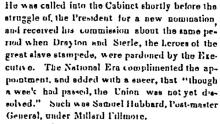Reminiscences.
At this period of time, when the "Conservative Whigs" of Georgia, emulating the hoarse vituperation of Mr. Toombs, are heaping obloquy upon the head of the President, it may not be amiss to detach ourselves for a season from the present, while we consider the character of the Administration to which they gave a recent, cordial, and continuous support.
The death of Gen. Taylor gave to Millard Fillmore, of New York, a position for which nature never designed him, and to which the voice of his countrymen never raised him. The same cruel fate which robbed America of a gallant hero, imposed upon her people an unsought President, and by a mysterious Providence it was directed that a New York Abolitionist should wear the mantle designed by a grateful nation for a favorite soldier. In the campaign of 1848, the bluff honesty of Gen Taylor atoned for the black record of his subordinate, but in 1850, the death claimed the veteran, and the author of the Erie letter fell heir to his hard-won honors.
Acceding to the Presidency under these circumstances, it became necessary for Mr. Fillmore to select a portion of his Cabinet from the ranks of the Northern politicians. Let us pause here, and consider the choice.
To the important post of the Treasury, he called Thomas Corwin of Ohio, a man of rare eloquence where his country was to be abused, and of rare dexterity where the South was to be betrayed.––His official career will be chiefly remembered because it followed the Galphin investigation, and begot the Gardiner trial. His unrelenting hostility to the South, constituted his chief claim upon the affections of the Whigs of Ohio, while for much of his notoriety, he was indebted to a speech to the Senate, where he expressed the hope that the Mexicans would greet the American soldiery with bloody hands, and hospitable graves. Like Judas, he announced himself a traitor, but there ends the parallel. The remorseful Jew died the death of a sentient villain, but this man was called to a high seat in the chief counsel of his nation. Such was Thomas Corwin, Secretary of the Treasury, under Millard Fillmore.
A worthy successor to Collamer, of Vermont was Samuel Hubbard, Post-master General of the United States, under the same dispensation. A pet of the Free-soil party, his appointment was probably considered a master stroke of policy.––He was called into the Cabinet shortly before the struggle of the President for a new nomination, and receive his commission about the same period when Drayton and Sierle, the Heroes of the great slave stampede, were pardoned by the Executive. The National Era complimented the appointment, and added with a sneer, that "though a week had passed, the Union was not yet dissolved." Such was Samuel Hubbard, Post-master General, under Millard Fillmore.
Distinguished from these enemies to the South by a mighty and subtle intellect, which caused that hostility in him to be dreaded, which in them we despised, high over their heads in the department of State, WEBSTER.
"––––– ––––– exalted sat,
By merit raised to that bad eminence.
At Abingdon, he had declared that the Massachusetts Whigs, of whom he was the chief, were as good Liberty men as the Free-soilers themselves, while at Buffalo he afterward solemnly appealed to history to avouch, that he had "never, never, voted for the admission of a single foot of Slave territory beyond the original thirteen States, the man could not show his face who would say that Daniel Webster had ever departed from that doctrine." Strong words––memorable words––when we remember those tickets, whereon were inscribed his name, and that of CHARLES J JENKINS. Such was Daniel Webster, Secretary of State, under Millard Fillmore.
A curious phenomenon and one which will prove interesting to the moral philosopher, is this: that the same patriots who now tremble fro their country under the Administration of Gen. Pierce were continually offering incense upon the altar of Millard Fillmore's fame. But, (an this is still more singular,) the recent Presidential canvass has developed this remarkable state of facts: the same men who distrusted Gen. Pierce, and Gen. Scott, were willing to take the field in favor of Daniel Webster himself, and the worthy citizen of Augusta, who now aspired to be Governor, suddenly dawned upon the country as a candidate for the Vice Presidency, under the auspices of the Great Expounder. And yet another phenomenon is this: that the same nervous politicians who are so agitated because one Brown has been appointed a Mail Agent, and one Vroom has been sent to Prussia––these same troubled spirits, we say, slept the sound sleep of security, while Webster, and Corwin, and Hubbard were enjoying the sweets of lofty office. Who will solve this riddle? Will Mr. Toombs? Will Mr. Trippe? Will innocent Mr. Jenkins himself come tour aid? Or, perhaps, gallant Andrew Miller will give us the light of his countenance anew, or the solemn Edipus of the Journal & Messenger will condescend to unravel the mystery? We shall not try––we only submit the questions to those more versed than we in the devious windings of the Conservative heart.
"Reminiscences," Macon (GA) Weekly Telegraph, August 2, 1853, p. 2.

